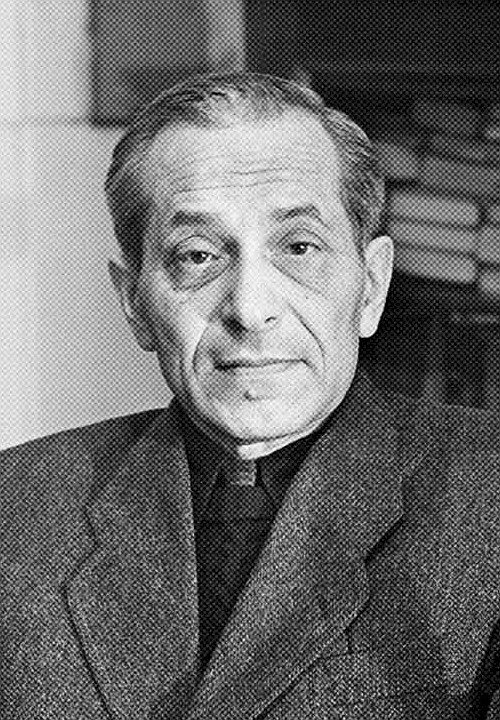Stepan Bogdanovich Likhodeev (Styopa)
English > Characters > Moscow characters > Stepan Bogdanovich Likhodeev
Context
In chapter 7 of The Master and Margarita, we can read that Stepan (Styopa) Bogdanovich Likhodeev is the director of the Variety Theatre who wakes up with an hangover and sees that Woland is waiting for him. He lives in the notorious apartment 50, together with the unfortunate Berlioz.
Woland reminds Likhodeev that he had promised him that he could have seven black magic shows in his theatre. Likhodeev doesn't remember such agreement. But Woland shows him the contract with his «dashing» signature; apparently Woland is manipulating the situation, but Likhodeev is bound by the agreement. When he realises that he wuill have to authorize Woland to perform, Woland introduces his retinue to the theatre director - Behemoth, Koroviev, and the small redhaired Azazello - and he tells them that they will need apartment number 50. Woland and his troup have a low opinion of people like Styopa Likhodeev; they think that people like him, in high functions, are scump - «Availing hisself of a government car!», the cat snitched, chewing a mushroom. «This retinue requires room» Woland says to Likhodeev, «'so there's just one too many of us in the apartment. And it seems to us that this one too many is precisely you».
Shortly after that Styopa is suddenly in Yalta.
Prototype
In the 1929 version of The Master and Margarita this character's name is not Styopa Likhodeev, but Garusha Pedulaev. The real life prototype of this character was Tuadzhin Peizulaev (?-1936). Peizulaev was a lawyer whom Bulgakov knew when he lived in Vladikavkaz in the Caucasus from 1919 to 1921, and he was the co-author of The Sons of the Mullah, one of Mikhail Bulgakov's first theatre plays, which was staged by a local theatre group in May 1921. This play was staged with great success, first in the Russian version, later in an Ossetian translation made by Boris (Besa) Ivanovich Totrov (1882-1964), the founder of the Ossetian National Theatre. Despite the success, Bulgakov didn't like the play. In some later stories like Notes on the Cuff (1922/1923) and Bohemia (1925) he wrote about it: «Whoever buys this play is an idiot». However, Peizulaev managed to sell it. Bulgakov burned the text in 1923 but, since «Manuscripts Don't Burn», a Russian copy of it turned up in the archive of an Ingush writer in Grozny, in the Chechen Republic, in the late 1960s, and is now kept in the Pashkov House in Moscow.
In the 1929 version of The Master and Margarita, Woland sent Pedulaev not to Yalta, but to Vladikavkaz. In later versions, the name Pedulaev changed into Stepa Bombeev and later into Stepan Likhodeev. Tuadzhin Peizulaev died in 1936 and that's probably why Bulgakov, out of respect, changed Pedulaev's name into Likhodeev and sent him to Yalta. In the final version of The Master and Margarita, Likhodeev keeps one small detail from the earlier versions, though: he returns to Moscow with «a Caucasian fur cap and a felt cossack coat».
Styopa's family name is certainly not meant as a compliment, since Лиходей [Likhodey] means scoundrel, blackguard, villain or rogue.
His patronimic or father's name Богданович [Bogdanovich] comes from Богдан [Bogdan], a Slavic name which is a contraction of the words Богом данный [Bogom danny] or Given by God. It is quite remarkable that the devil Woland sent this «godsend» to Yalta.
Yalta
The situation in Yalta refers to Earthquake, a story from 1929, written by Mikhail Mikhailovich Zoshchenko (1895-1958) in which the hero, Ivan Yakovlevich Snopkov, wanders through Yalta in his underwear, as the result of a drinking problem. Before the earthquake mentioned in the title, Snopkov had emptied one and a half bottle of vodka, he fell asleep, and got robbed of his clothes by plunders. Such incidents really happened after the earthquake which disstressed the area of Yalta on September 11, 1927, by the way.
Black tomcats and amnesia
The syndrom of seeing black tomcats and having amnesia as a result of drinking port already appeared in earlier work of Bulgakov: in Чаша жизни [Chasha zhizni] or The Cup of Life (1922) and in День нашей жизни [Den nashey zhizni] or Days of our Life (1923).
A «dubious conversation»
Likhodeev's concern about the seal on Berlioz's door and a «dubious conversation» that had taken place in the apartment is an allusion to what happened to one of Bulgakov's friends, the actor Nikolai Vasilevich Bezekirsky. Bezekirsky was arrested and banned to Ryazan because of «a contarevolutionary discussion in a certain house that I visited regularly» as he wrote in a letter to Bulgakov on this subject in April 1929.
Share this page |
Characters in Moscow
- Annushka
- Archibald Archibaldovich
- George Bengalsky
- Mikhail Aleksandrovich Berlioz
- Ivan Nikolayevich Ponyrov (Homeless)
- Nikanor Ivanovich Bosoy
- The sketch-writer Khustov
- Latunsky, Ariman and Lavrovich
- Stepan Bogdanovich Likhodeev (Styopa)
- Savva Potapovich Kurolesov
- Professor Kuzmin
- Baron Meigel
- Aloisy Mogarych
- Maximilian Andreevich Poplavsky
- Alexander Riukhin
- Arkady Appolonovich Sempleyarov
- Andrey Fokich Sokov
- Doctor Stravinsky
- Ace of Diamonds
- The writers at Griboedov's
- Other characters in Moscow
Your guide through the novel

In this section are explained, per chapter, all typical notions, names of people and places, quotations and expressions from the novel with a description of the political, social, economical and cultural context.
